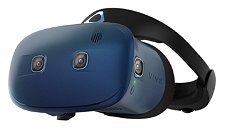Raevenlord
News Editor
- Joined
- Aug 12, 2016
- Messages
- 3,755 (1.16/day)
- Location
- Portugal
| System Name | The Ryzening |
|---|---|
| Processor | AMD Ryzen 9 5900X |
| Motherboard | MSI X570 MAG TOMAHAWK |
| Cooling | Lian Li Galahad 360mm AIO |
| Memory | 32 GB G.Skill Trident Z F4-3733 (4x 8 GB) |
| Video Card(s) | Gigabyte RTX 3070 Ti |
| Storage | Boot: Transcend MTE220S 2TB, Kintson A2000 1TB, Seagate Firewolf Pro 14 TB |
| Display(s) | Acer Nitro VG270UP (1440p 144 Hz IPS) |
| Case | Lian Li O11DX Dynamic White |
| Audio Device(s) | iFi Audio Zen DAC |
| Power Supply | Seasonic Focus+ 750 W |
| Mouse | Cooler Master Masterkeys Lite L |
| Keyboard | Cooler Master Masterkeys Lite L |
| Software | Windows 10 x64 |
The pace of innovation can't stand still, and if there's one space that needs cost-cutting and new product injection to increase its install base is the VR ecosystem. HTC took to CES 2019 to reveal their new take on the VR, a semi-portable VR headset that has been designed not only for room-scale VR, but also for home use and, cryptically, on-the-go (holy moly, the headset flips up towards your forehead!).
Apparently, the Cosmos will have the ability to be powered by your smartphone and perhaps other devices - not all that surprising when you think of the RAM and computing power that it holds right in the palm of your hands (I'll say. My smartphone is a much better performer than my work PC...). And HTC says the Cosmos will be their sharpest VR headset ever - which should mean that it should feature higher resolution than the Vive Pro's 2880×1600 (1440×1600 per eye) display. A smartphone would likely only be able to power some sort of augmented reality graphics on that resolution, though - but I might be wrong.



The Cosmos will take a modular approach from the ground-up, which means additional equipment (maybe a full wireless solution) and other attributes (which, we don't know) will be able to be attached to the headset in the future. It features inside-out tracking (needed for that on-the-go capability, unless you're walking around with a circle of Lighthouse base stations) and new controllers a la Oculus' Quest.


There's also a new Vive platform coming up, the Vive Reality System, which serves as both user interface, VR browser, digital storefront (with VR games and other content being available) and a social service. Support for Steam VR is still present. Pricing, you ask? That's likely the most important question, though there's no answer to that just yet. But considering the adoption rate for VR, and absent the launch of a killer app (like a real Halo game, I mean, come on, why don't they see it?) a market penetration strategy with a democratization of the entry point towards lower pricing might be the required jolt for VR as a whole.
View at TechPowerUp Main Site
Apparently, the Cosmos will have the ability to be powered by your smartphone and perhaps other devices - not all that surprising when you think of the RAM and computing power that it holds right in the palm of your hands (I'll say. My smartphone is a much better performer than my work PC...). And HTC says the Cosmos will be their sharpest VR headset ever - which should mean that it should feature higher resolution than the Vive Pro's 2880×1600 (1440×1600 per eye) display. A smartphone would likely only be able to power some sort of augmented reality graphics on that resolution, though - but I might be wrong.



The Cosmos will take a modular approach from the ground-up, which means additional equipment (maybe a full wireless solution) and other attributes (which, we don't know) will be able to be attached to the headset in the future. It features inside-out tracking (needed for that on-the-go capability, unless you're walking around with a circle of Lighthouse base stations) and new controllers a la Oculus' Quest.


There's also a new Vive platform coming up, the Vive Reality System, which serves as both user interface, VR browser, digital storefront (with VR games and other content being available) and a social service. Support for Steam VR is still present. Pricing, you ask? That's likely the most important question, though there's no answer to that just yet. But considering the adoption rate for VR, and absent the launch of a killer app (like a real Halo game, I mean, come on, why don't they see it?) a market penetration strategy with a democratization of the entry point towards lower pricing might be the required jolt for VR as a whole.
View at TechPowerUp Main Site



